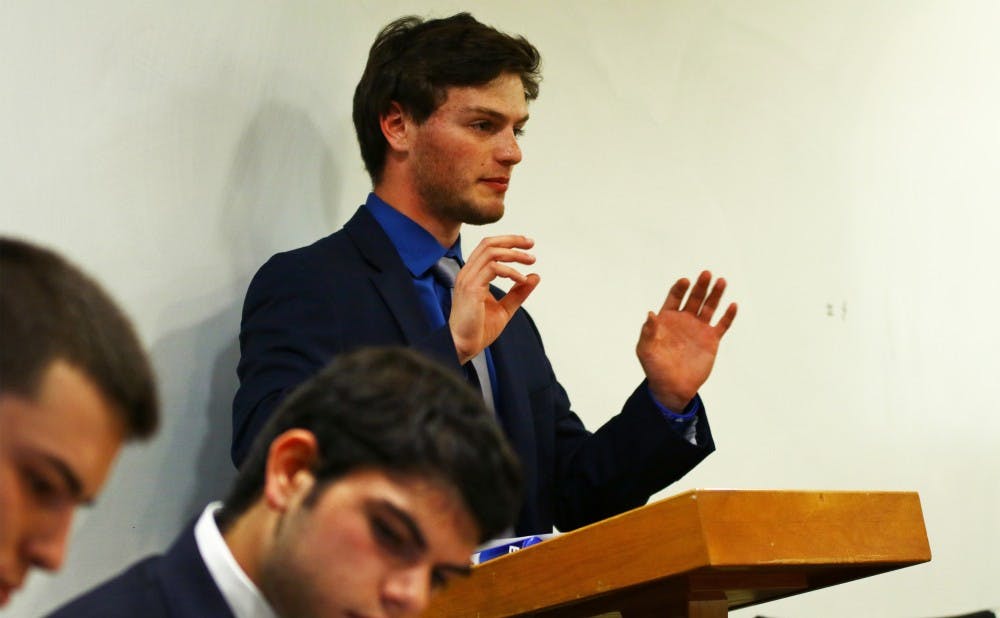After a series of vetoes and rescinded vetoes, the Duke Student Government Judiciary decided to release its decisions about two cases by noon Tuesday.
Petitioners Executive Vice President John Guarco, a junior, and junior Tanner Lockhead, vice president for Durham and regional affairs, argued that DSG President Keizra Mecklai acted unconstitutionally in vetoing $20,000 of funding for the Chanticleer, Duke's student yearbook. The Judiciary also heard a case brought by junior Ilana Weisman, vice president for equity and outreach, and several other senators Sunday about the funding allocation for the Peer Advocacy for Sexual Health center that was modified during last week's senate meeting.
Following deliberations, the Judiciary dismissed the suit against Mecklai, a senior, as a whole because she had issued another veto earlier in the day to reject the entire annual budget, which would nullify her previous line-item veto of the Chanticleer funding, the central issue of the case.
“The Judiciary has unanimously decided to reject the case Lockhead and Guarco v. Mecklai on grounds of standing, since the most recent presidential veto overrides any previously issued vetoes,” wrote Chief Justice Dana Raphael, a junior, in an email. “Questions regarding the line-item veto and sufficient justification then need not be answered.”
After receiving the Judiciary's decision, Mecklai rescinded her previous veto of the annual budget and requested that the Judiciary still adjudicate the case. Raphael said that a decision would be available by noon. The DSG constitution and bylaws do not explicitly enumerate a presidential power to rescind a veto. Mecklai wrote in an email that both Guarco and Lockhead had agreed not to challenge the rescinded veto in the Judiciary.
The case centered around Guarco's argument that Mecklai had unconstitutionally rejected a line item of the budget providing $20,000 for the Chanticleer. Mecklai also vetoed a measure that would transfer $20,000 from the surplus fund to the Chanticleer, a veto which was not under litigation and remains in effect. Senior Brian Hopkins, senate president pro tempore, argued on Mecklai's behalf that the annual budget was made up of budgetary statutes, not line items. Accordingly, he said that the president has the power to veto budgetary statutes.
Guarco disagreed, noting that he believes Mecklai is not allowed to veto parts of legislation.
“The same way [the president] cannot strike a section of a budgetary statute or a part of a resolution, [the president] cannot strike a component of the annual budget,” Guarco said in his argument.
The Judiciary also heard from petitioner Josh Curtis, a freshman senator for academic affairs who originally presented the PASH Responsibility Act, which required the budget for the PASH center to have greater specificity about how it spends its funds. In response, the Judiciary heard from respondents Michael Brunetti, a freshman, and sophomore Edward Torgas, two senators who pressed for the subsequent PASH Reform Act, which decreased the entire funding allocation for the PASH center.
Curtis, who filed the suit along with Weisman, argued that his legislation—co-sponsored by freshman Jackson Dellinger, senator for Durham and regional affairs—had an entrenchment clause, which prevented further legislation from changing the funding allocation for sexual pleasure products and replacing his legislation. He noted that the PASH Reform Act changed the funding allocation.
DSG Policy Advisor Michael Pelle, a senior, was deemed an expert witness and noted that clauses preventing statutes from being repealed are unenforceable and do not follow precedents set by the United States Supreme Court and other international courts.
“It’s highly problematic to allow a majority in a legislature to raise the threshold for an appeal of future laws,” Pelle said in his testimony.
Pelle, however, noted that entrenchment clauses were not explicitly outlawed in the DSG constitution. Raphael said that a decision in the case would be available at noon.
Get The Chronicle straight to your inbox
Signup for our weekly newsletter. Cancel at any time.
Class of 2019
Editor-in-chief 2017-18,
Local and national news department head 2016-17
Born in Hyderabad, India, Likhitha Butchireddygari moved to Baltimore at a young age. She is pursuing a Program II major entitled "Digital Democracy and Data" about the future of the American democracy.

